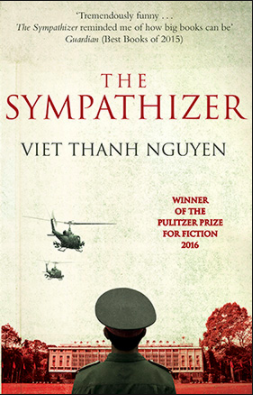|
‘The Sympathizer’ by Viet Thanh Nguyen. Book Group 1 October 27th 2017 |
|
|
|
The Sympathizer is a Pulitzer prizewinning novel about the Vietnam War, written by Vietnamese American author, Viet Thanh Nguyen. It tells the story of an unnamed Vietcong spy deeply embedded undercover as a senior personal aide to an influential South Vietnamese general. He is a complex character, struggling with his identity: his unacknowledged father had been a French priest and his pitiful mother had been the church housekeeper. As a child, he had been bullied at school, and considered an outcast by his relatives. If not for two bosom pals, who feature significantly in the novel, he would have been almost totally isolated. Interestingly, the friends line up on different sides in the forthcoming war, foreshadowing his own dilemma of existing between both worlds.
After studying in the US, he returns to Vietnam and opts for the undercover life of dissemblance as a Communist spy, without seeming to have any ideological belief in the cause. His choice seems more one of a personal rebellion against the status quo. In fact, throughout the book he seems both to ‘sympathize’ with the opposing sides in equal measure to the disdain he feels for them. He recognises that there is little to choose between the two ideologies in methodology and brutality. The dangerous duality of his existence also underpins his own struggle for identity: he is neither west nor east, communist or nationalist, he can slip easily into either existence, yet neither claims him.
After the fall of Saigon, he is airlifted out with the general and others to begin a new life in the US where he continues with his double life and is forced to make disturbing moral choices to maintain his disguise. One of the most interesting sections of the book is where he becomes a consultant on a big budget Hollywood movie about the Vietnam War, (a thinly veiled ‘Apocalypse Now’). His purpose is to ensure that the Vietnamese are represented in a believable light but he inadvertently contributes to the stereotyping of his people as either victims or evil Vietcong, and ends up criticized by both sides.
The novel is extremely well written, witty and satirical, with the slick dialogue and dark irreverent humour that is familiar from films like ‘MASH’ or ‘Good Morning Vietnam’. But this time the wry commentary comes from a Vietnamese rather than an American. Some of the most enjoyable sections of the book are in the Kafkaesque moments of absurd reality that our ‘hero’ views with sardonic wit aimed equally at all sides: Communist, South Vietnamese and American.
It is not, however, a comfortable read. We found it difficult to ‘sympathize’ with The Sympathizer and most of the characters, although we were intrigued by the women, who often dealt with the trauma of war and displacement with more practical courage than the men. Unfortunately, the denouement of the story did not seem to deliver what the novel had promised earlier. Some aspects of the final section appeared to be contrived. Book Group 1 agreed that while it is an important book, not only for what we learned about the Vietnamese view of the war and the migrant experience, but also for its fascinating insights into duality and identity, it was not ultimately a book we ‘enjoyed’. Having said that, it led to a very wide ranging discussion. ‘The Sympathizer’ is an important addition to literature on the Vietnam War, particularly as we approach the 50th anniversary of its conclusion.
By Rose Gan |





